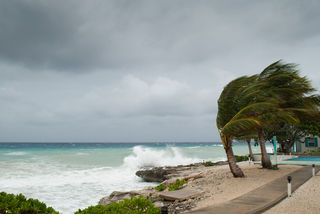
The moment took me completely by surprise. I was doing nothing unusual or scary, like rock climbing or sky diving, but sitting quietly in my own living room on a lovely spring evening. I was watching a news program as it described the far-reaching effects of climate change — massive pieces of glacier caving into the Arctic Ocean, coral reefs bleached white by warming waters, a million species already extinct, and countless others threatened, violent weather that can strike anytime, any place.
I suddenly felt a wave of fear sweep over me, a quaking deep in my body, a felt sense of foreboding. In a dramatic moment, I had a visceral, fear-driven experience of what we are doing to our planet.
We’re all familiar with many variations of this experience — maybe an unsettling moment when worry or anxiety creep in, or the sudden terror when a car swerves dangerously close, or maybe the gnawing fear that we have a serious illness. From the personal to the universal, we’re living in an uncertain world where feelings of anxiety and fear seem more prevalent than ever.
The question is how we respond to these challenging moments. How do we deal with fear? This question is a familiar one to many of us. Like any obstacle, fear is a doorway. Much as we may recoil from it, it is an invitation to explore what triggers it, recognize its roots and identify its patterns.
We can begin with a “welcoming practice,” opening ourselves to the first stirrings of fear the moment they occur. Here is a four-step process I use for investigating fear:
1. Fear always starts as energy in the body. We need to meet that energy, open fully to it, and let it run its course. There may be fear of fear itself, but if one can stay with the cascade of feelings, they will diminish. The less one resists, the faster that happens. In any of its forms, working with fear calls for self-acceptance, kindness, and great courage.
Fear often has repeating messages that come with it, such as “I’ll never get over this,” or “This feeling of terror is going to overwhelm me.” These messages stoke the fires of fear, so it’s important to identify them. Experiment with refuting these messages with an affirmation such as, “My courage is stronger than fear,” or “I have strength of heart,” or simply, “May I be free from fear.”
2. Come to that ever-present ally — the breath. Invite slow, steady breathing, and let go of the fear with your out-breaths. This will activate the parasympathetic nervous system and quiet the energy coursing through the body. Fear is a contraction, whereas the breath softens the fear’s tendency to tighten.
A wise Buddhist teacher said, “Letting go is the heart of the wisdom teachings. If you let go a little, you’ll have a little freedom. If you let go a lot, you’ll have a lot of freedom. And if you let go completely, your heart will be completely free.”
3. Investigate. What is fear asking me to pay attention to? What is my habitual response, and what might I do differently next time? Even dialoguing with the fear as if it’s an entity helps to soften and dis-identify from it. One can also invoke a calming image, such as a safe, peaceful place or the presence of a spiritual teacher.
4. Expand your field of awareness to include all who experience fear, from those you know to everyone who suffers from fear. Imagine that you are breathing with them, and extend loving kindness to them, for example, “May you be free from fear, may your heart be at ease.” This step helps to soften the feelings of isolation and helplessness that can accompany fear.
Above all, we need to have compassion for ourselves as we work with our fear. It is an inevitable part of the journey, part of our humanity. As we stop struggling with our fear, courage and confidence start to arise in the heart.
I’ve always loved the inspiring message of the 20th-century Indian master, Sri Nisargatta Maharaj:
“Fear creates the abyss. Love crosses it.”
Challenging as it is, when we open to fear, open to the unknown and accept life’s uncertainties, we will eventually have the blessings of a fearless heart. May that be so for all of us.




